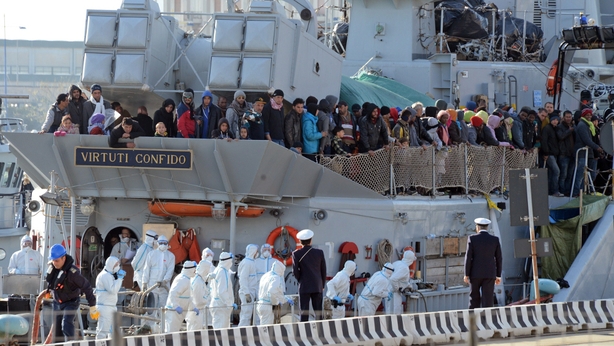An Italian judge has ordered that the presumed captain of a migrant boat that sank with the loss of more than 700 lives should remain in custody after prosecutors asked for him to be charged with homicide and people-trafficking.
Mohammed Al Malek, 27, denies that he was in charge of the heavily overloaded fishing boat that capsized off Libya late on Saturday with hundreds of African and Bangladeshi migrants locked in its lower decks.
"He says he's a migrant like all the others and he paid his fare to go on the boat," his lawyer, Massimo Ferrante, said outside the courtroom.
However, Catania chief prosecutor Giovanni Salvi said the judge had ordered both Mr Malek and 25-year-old Syrian Mahmud Bikhit, who is accused of being a member of the crew, to be detained in custody.
Both men were arrested on Monday night when they arrived in Sicily with other survivors of the shipwreck.

The Tunisian showed little emotion as the preliminary hearing began behind closed doors in a court in the Sicilian city of Catania where he will come face to face with a number of survivors who will be giving testimony.
Prosecutors say he mishandled the fishing boat and caused it to collide with a Portuguese merchant ship which was coming to its assistance. As the passengers rushed to one side, hoping to be rescued, the grossly overloaded vessel capsized and sank.
They have also heard testimony from witnesses who said they were beaten and abused by club-wielding traffickers before they were embarked.
Mr Bikhit has accused Mr Malek of being in charge of the vessel but he has denied being a crew member and said he was on the ship as a migrant.
Only 28 people survived the disaster, believed to be the heaviest loss of life on the Mediterranean in decades and which underlined the scale of the migrant crisis facing Europe.
The sea is one of the main routes into the European Union for tens of thousands of mostly Asian and African migrants fleeing war and poverty, with almost 40,000 people having arrived this year already.
The scale of the disaster has also raised pressure for action by EU countries, who pledged this week to step up search and rescue operations in the southern Mediterranean.
After interviewing the survivors, prosecutors have concluded that more than 750 people are likely to have been aboard the 20-metre-long fishing boat, but with most locked in the hold and lower deck, only 24 bodies have been recovered.

